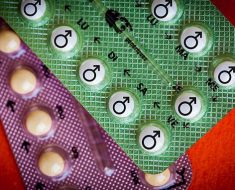Infertile men may have a higher risk of early death: Men with ‘blockage’ issue have average life expectancy of 50
- About 15% of men with fertility issues have no sperm in their semen – known as azoospermia
- Researchers studied data on more than 50,000 Danish men from 1994 to 2015
- Those with azoospermia had an average life expectancy of 48.8 years old
Men with a certain type of infertility have a much higher risk of premature death, a sobering new study reveals.
Those who have no sperm in their semen – about 15 percent of male infertility cases – have an average life expectancy of 48.8 years old, according to data on more than 50,000 Danish men from 2006 to 2015.
Up until a few years ago, male fertility issues were lumped into one category, until research showed that there are three broad categories.
Lead researcher Dr Clara Helene Glazer said her team was stunned that this one category, known as azoospermia, carried such high mortality risks while the other categories didn’t.
While there is nothing to show why this is the case, Dr Glazer said it may be due to underlying genetic factors.

Men with no sperm in their semen (a condition called azoospermia) have a two times greater risk of dying than men with other fertility issues, and fertile men
‘I was quite surprised that the azoospermic men had such a high risk,’ Dr Glazer told DailyMail.com.
‘The strongest hypothesis that the association between male infertility and mortality could be due to common underlying genetic factors.
‘Certainly, more research is needed to identify interventions that could ultimately improve the health outcomes of these men.’
Dr Glazer, a medical doctor based in Copenhagen, started a PhD two years ago to find some answers about how male infertility influences, or is influenced by, general health.
Her first work showed male infertility was linked to higher risks of certain diseases, including heart disease and diabetes.
This study was to look further: what were the mortal impacts of that connection?
About one percent of men in the world are azoospermic, but among men with fertility issues it’s not so uncommon – accounting for about one in six.
Azoospermia is characterized by a total lack of sperm in the man’s semen.
The most common reason for this is a blockage in their anatomy that prevents sperm from entering the semen, known as obstructive azoospermia. Fewer have non-obstructive azoospermia, which is usually explained by genetic abnormalities with the testicles.
Oligospermia is a low sperm count which can be linked to various factors including restricted veins, sexually-transmitted infections, drug use, hormone imbalances, high BMI, exposure to chemicals – the list goes on.
Though the conditions are distinct, Dr Glazer said she presumed there would be a mortality risk for both men and women.
-

Male fertility crisis: Obesity, smoking and exposure to…
EXCLUSIVE: Are women being sold an expensive fertility lie?…
Share this article
Infertility is linked to all manner of life-threatening conditions in women, and is usually caused by factors that would likely be affecting the rest of the body.
The data, being presented this week at the American Society for Reproductive Medicine (ASRM) conference in Denver, categorized men into groups of azoospermic, oligospermic, normal, vasectomized, or those with other fertility issues.
They only included men from 2006 onwards, which was when fertility clinics started categorizing men into groups of azoospermia, oligospermia, or other. Prior to that, oligospermia and azoospermia were lumped together, or azoospermia was not included because they could be azoospermic due to vasectomy.
They found men with azoospermia had a two times greater risk of dying than the rest, mostly to cancer or cardiovascular disease.
To their surprise, men with oligospermia or other types of infertility had the same life expectancies as fertile or vasectomized men.
‘Based on our previous studies, and other studies in the field, we were expecting also to find a higher risk among men that had oligospermia. We found a slightly increased risk, but not like we had expected.’
Dr Glazer believes there may be an early death risk for men with oligospermia, too, but their data does not extend long enough to determine that.
These findings are part of a small but growing movement to research sperm more closely.
‘The risks of female infertility and general health has been studied quite a lot,’ Dr Glazer explains. ‘But the association between male infertility and general health is sort of new.’
Plenty of that has to do with the industry’s laser focus on females.
Women are the headline act when it comes to fertility, since the vast majority of the reproduction process happens in their body, and all of that is monitored and documented, making it easier to study.
Once ICSI was invented in the 1990s – a procedure that allows practitioners to literally inject the sperm into the egg – that seemed to solve any issues of slow swimming sperm or low sperm count, kicking the can of male fertility further down the road of research.
Increasingly, though, it’s becoming clear that there are many male-specific factors that need to be parsed out to improve fertility for all – a question becoming ever more pertinent as sperm quality and count declines globally and more men require fertility treatment to conceive.
‘A man’s infertility status is a component of his whole health status,’ said Peter Schlegel MD, ASRM president-elect.
‘Semen analysis results exist on a continuum, but a diagnosis of azoospermia may be a call to take a closer look at a man’s overall health in addition to his reproductive function.’
Source: Read Full Article





